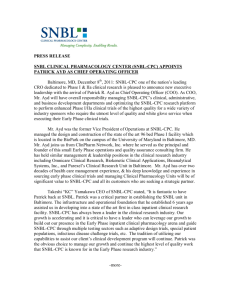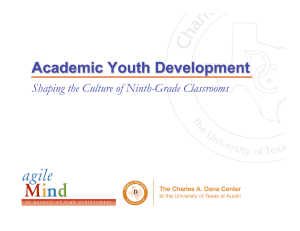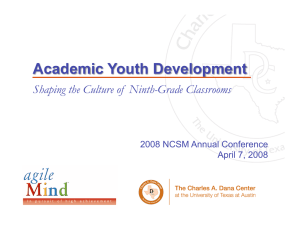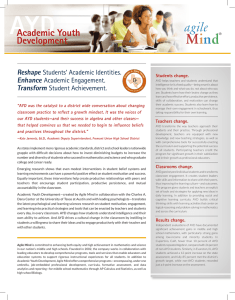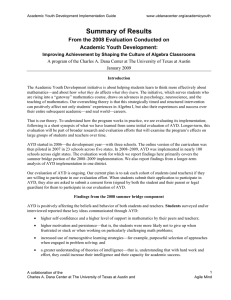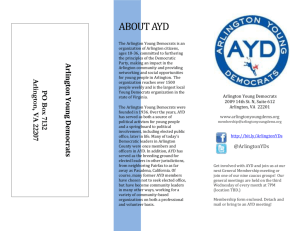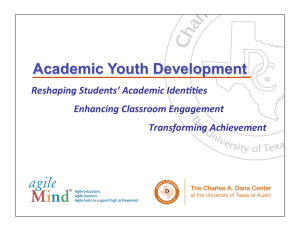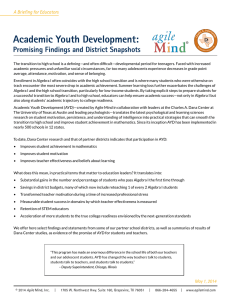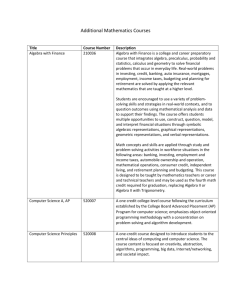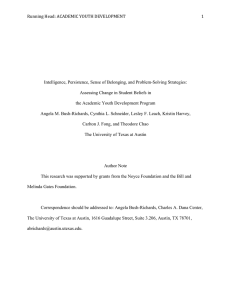Lessons Learned Urban Mathematics Leadership Network February 11, 2013
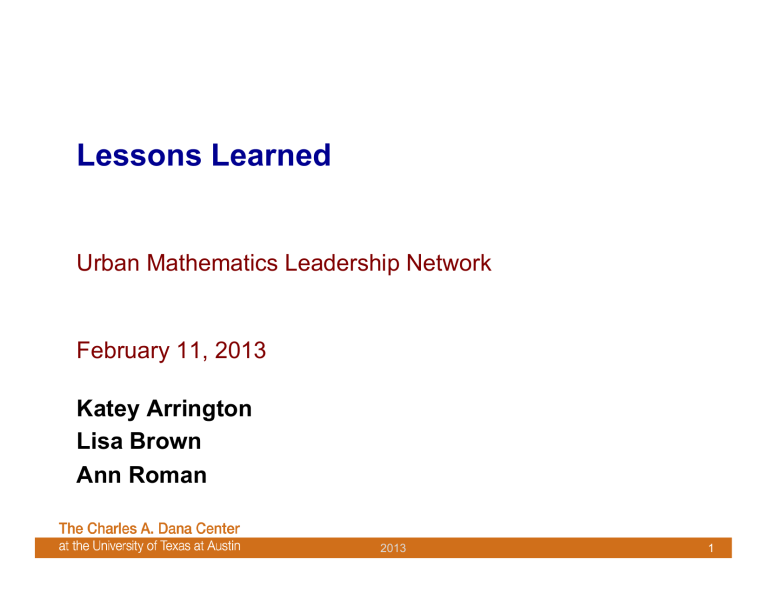
Lessons Learned
Urban Mathematics Leadership Network
February 11, 2013
Katey Arrington
Lisa Brown
Ann Roman
2013 1
Lessons Learned
Graffiti Walk
Reflect on your lessons learned over the past few years of planning for implementation of the CCSS.
Be prepared to discuss those lessons learned as specifically related to:
• guaranteed and viable curriculum
• intended/written curriculum
• taught/enacted curriculum
• learned/assessed curriculum
• system and culture
2013 2
Systems and Culture
Dana Center Lessons Learned
Must have clear expectations and support at all levels of the system, including time and space for the expectations to be realized.
2013 3
Inspirations from research and practice
AYD is based on the ground-breaking work of leading theorists, researchers, and practitioners:
• Attitudes and beliefs (Dweck, Bandura, Eccles)
• Malleability of intelligence
• Self-efficacy
• Motivation
• Processes and practices (Zimmerman, Bandura)
• Self-regulation
• Productive persistence
• Problem-solving
• Culture of learning (Balfanz, Treisman)
2013 4
The AYD Family of Programs
Summer-Start AYD
• Shapes attitudes, beliefs, and motivation toward learning
• Strengthens important algeba-readiness concepts and problem-solving skills
• For students at or near grade level entering Algebra I
• Summer immersion experience and Algebra I AYD Toolkit
School-Year AYD
• Designed for students in grades 8, 9, or 10
• Youth development and problem-solving curricula are embedded in brief instructional experiences throughout the year
• Students apply their new knowledge and skills to learning in all of their courses, and to mathematics in particular
Intensified Algebra I
• Comprehensive course with additional supports for struggling learners
• For students entering Algebra 1-2 grade levels behind
• Full-year intervention
• 70-90 minutes per day
An Educator’s Course in AYD
• Professional development course for educators interested in key influences on student learning and achievement
• Blended PD experience that includes an in-person seminar and self-study and collaboration through an online learning community
• Explores educator practices for enhancing student engagement and achievement
5
2013
The AYD Family of Programs
Common foundations
Youth development knowledge and skills
Problem-solving strategies and skills
Teaching strategies to engage learners
Summer-Start AYD
(SS-AYD)
School-Year AYD
(SY-AYD)
Student Audience
An Educator’s Course in
AYD (E-AYD)
Educator Audience
Common outcomes
Increased engagement and achievement
Reshaped academic identities
College and career readiness
2013
6
6
Intended/Written Curriculum
Dana Center Lessons Learned
Educators need time and tools to collaboratively study the standards and written curriculum documents.
It is helpful to have documents or tools that provide different viewpoints on the written curriculum.
Year at a Glance
Sequenced Units
(Units of Study)
(Lesson Alignment Templates)
Progressions Documents
Assessment Consortia Documents
2013 7
Taught/Enacted Curriculum
Dana Center Lessons Learned
Common Core State Standards
• Focus
• Coherence
• Rigor
Standards for Mathematical Practice in context
2013 8
Learned/Assessed Curriculum
Dana Center Lessons Learned
Evidence-Centered Design
Observation: Practice forward tasks seem to emphasize
• MP.3 Construct viable arguments and critique the reasoning of others
• MP.4 Model with mathematics
• MP.6 Attend to precision
2013 9
Thinking about Lessons Learned
Reflection
Three things you have learned.
Two things you have squared away.
One thing that is still circling.
2013 10
